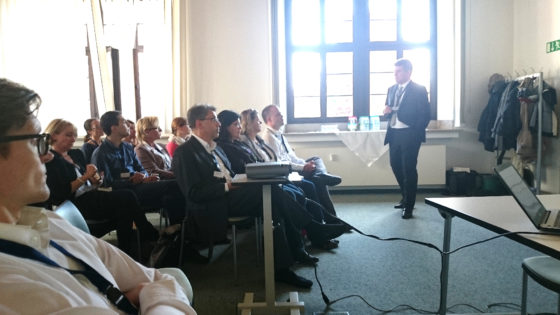Note: This report is provided by Dr. Zhen Huang from Shanghai De Chen Consulting, which content is based on documentation and interpretation of the author and his team colleagues without claiming to be correct or exhaustive.
Shanghai, September 16, 2018
According to common understanding in Western business community, a business is “sustainable” if it could meet the following triple “bottom lines”: the economic or financial bottom line (optimizing financial performance in the sense of increasing shareholder value), the ecological bottom line (making contribution to environmental protection) and the social bottom line (taking social responsibilities of the business).
In China, new law and regulations are now in place to force companies to take more actions for environmental protection. There is a clear call of government and public for greener economy. Besides of this, compliance issues in the areas such as IT & data security are coming more and more on the table of business executives. And China is – taking the name of a German Chamber campaign – “More than A Market”: With the increasing requirements related to labor and social responsibility, companies in China have also to review current practice and improvement potential for social/corporate responsibility management in the country. Because of this, “Business Sustainability”, which has been a hot topic of academic and business leaders in German-speaking countries about one or two decades ago, is also getting more and more important in China.
Picture 1: Plenum of 2018 Sino-German Controlling Forum
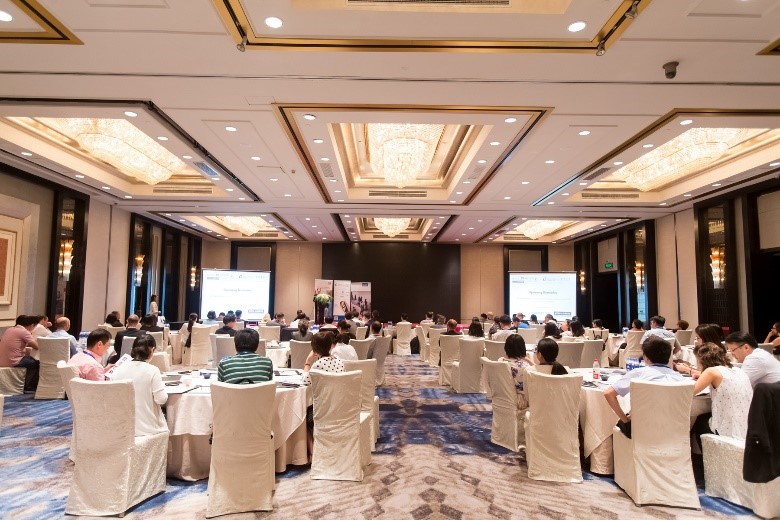
Source: Organization team of the Forum
The 6th installment of the Sino-German Controlling Forum, which had the headline “Controlling for Sustainability – Achieving Economic & Ecological Success in China”, had the objective to provide a platform for sharing knowledge, information, and experience for managers and controllers who would like to make their business in China more sustainable. It took place in the Pan-Pacific Hotel in Suzhou on September 7, 2018. More than 80 finance & controlling managers and professionals as well as controlling-minded non-financial executives coming from the Sino-German business community attended the Forum (please see the picture 1).
The Forum was opened by Mrs. Sigrid Winkler, Executive Manager of German Chamber Shanghai. She welcomed all participants and underlined the importance of sustainable business in China and the role of controlling. After the opening remark, there were two keynote presentations from representatives of Sino-German business community:
Picture 2: Group picture of VIP Speakers and Moderators of the Forum
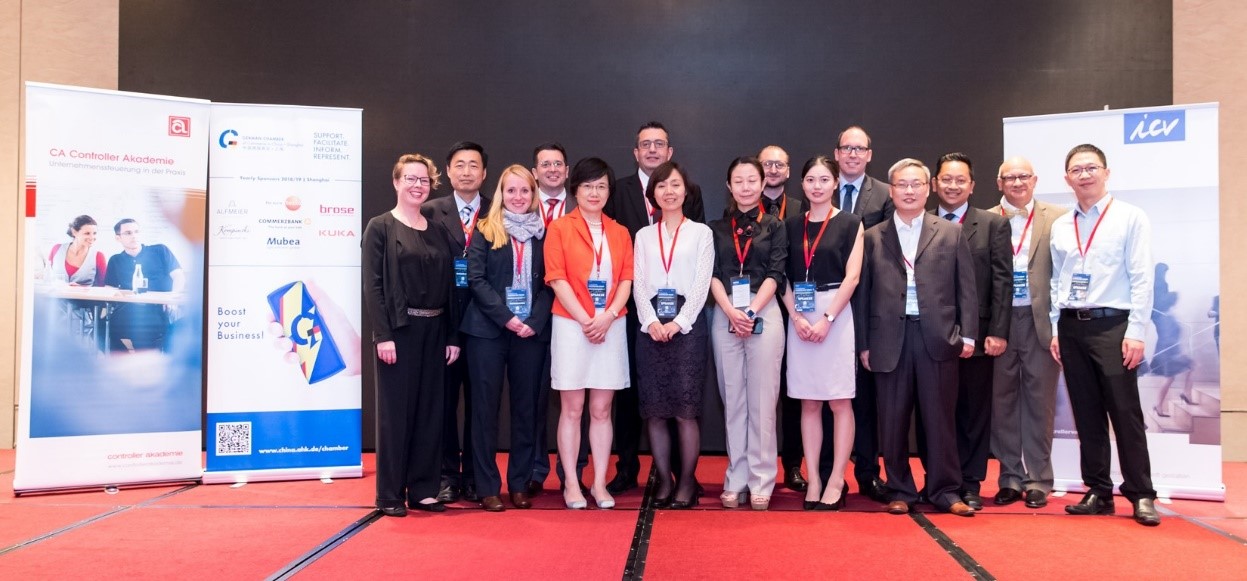
From left to right are Mrs. Sigrid Wikler (German Chamber Shanghai), Dr. Zhen Huang (Shanghai De Chen Consulting), Ms. Sahra Oemmelen (PwC), Mr. Alexander Prautzsch (PwC), Mrs. Chazy Zhou (Weidmueller China), Mr. Alexander Tobert (Kern-Liebers China), Ms. Lu Wang (Bayer China), Mrs. Annie Xue (Rui Bai Law Firm), Mr. Oliver Diehm (Brose China), Ms. Hui Xu (Schaeffler Greater China), Mr. Francesco Ingarsia (Schaeffler Greater China), Mr. River Yu (Schaeffler Greater China), Mr. Ramesh Moosa (PwC), Mr. Peter Corne (Dorsey & Witney LLP) and Mr. Keven Chen (Weidmueller China).
Source: Organization team of the Forum
The first key note speech with the title “Controlling for Sustainability – Experience of a Sino-German Joint Venture” came from Mr. Carsten Arntz, Head of Finance of SAIC Volkswagen Automotive Co. Ltd., a 50-to-50 joint venture of the Chinese automotive giant Shanghai Automotive Group and the German Volkswagen Group. With more than 34.000 headcount and standard capacity of more than 1.9 million units p.a., SAIC Volkswagen belongs to the leading automotive manufacturers in China. Radical product and business model innovations leads to transformation of the automotive industries with related sustainability opportunities and challenges. SAIC Volkswagen has established a three pillars approach covering economic, environmental and social sustainability incorporated into the Strategy 2025. Although green controlling (here in the sense of eco-oriented controlling) is not organized in a central organizational unit in SAIC Volkswagen, different parts of the finance team are engaged more-or-less in green-related activities, such as energy analysis & controlling, material cost controlling, feasibility analysis for capex and strategy projects, and environmental KPI tracking and steering in the factories. And sustainability management and green controlling are corner stone of the short-term development of the finance & controlling team of SAIC Controlling.
Picture 3: Audience during the key note session
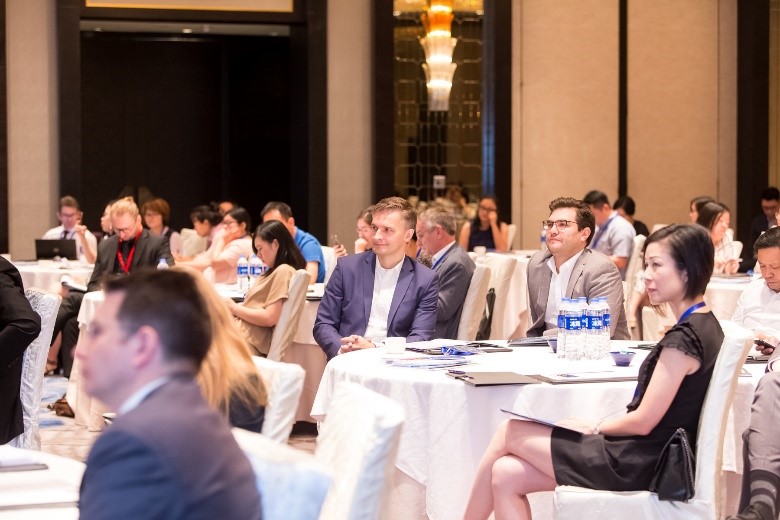
Source: Organization team of the Forum
The second key note speech with the title “Controlling for Sustainable Business from the View of an SME”, which was held by Mr. Alexander Tobert, Chief Financial Officer of Kern Liebers (KL) China, has more focus on the social/people-related aspect of sustainable business in China and the success factors for controlling in small-to-medium sized companies. KL is a family-owned business with a history of over 130 years. Since the start in 1993 up to now, KL China business has grown by 22% p.a. (CAGR) in terms of sales revenue. Taking social responsibility means for KL China not only different CSR projects in the public but also optimized people/talent management in own company. As a SME, KL put much effort for local talent acquisition, development and retention as well as local employee relationship management. HR controlling of KL supports management in setting targets, defining measures and monitoring the progress of planed actions. Different tools are in use, such as HR scorecard / KPIs, talent / qualification matrix, strategic and operational workforce planning & forecast, and gap analysis etc. To be valuable business partner to management, controlling in SMEs should be built upon qualified manpower, technology & system tools as well as a good organization & culture. Key success factors for SME controlling are excellence of both process and people.
Following the practice in the previous years, the Forum offered to the participants six different theme workshops after the key note speeches. Each participant could attend one workshop in the morning and one in the afternoon. Besides workshops with more “classical” topics of controlling, such as project controlling, plant/production controlling, cost controlling, and planning & budgeting, this year’s Forum had two workshops with specific focus, such as “environmental compliance” and “compliance & data security”.
In the workshop “Project Controlling in a Changing Environment“, Mr. Oliver Diehm, Director Controlling at Brose China, introduced the audience into the practice of project controlling of the company. Brose China is one of the leading family-owned automotive suppliers with global HQ in Germany. Due to the nature of its business, Brose China put much emphasis on optimization of its project controlling function. In the view of Mr. Diehm, good project controlling should take both the characteristics of business, the characteristics of organization as well as the changing market situation into account. Good framework of project controlling should ensure the consistency of KPIs in all projects, which means that one should use the same KPIs in product calculation, planning and reporting (consistency over time), and that identical KPIs should be used for projects, customer teams, business divisions and groups (consistency in different levels of detail). Project controller should have the right mindset and knowledge for supporting project manager and customer teams, which is not only related to financial/commercial issues but also to other aspects of a project, such as environmental / eco-related costs and capex of the project.
Picture 4: Participant asking questions durch Q&A session
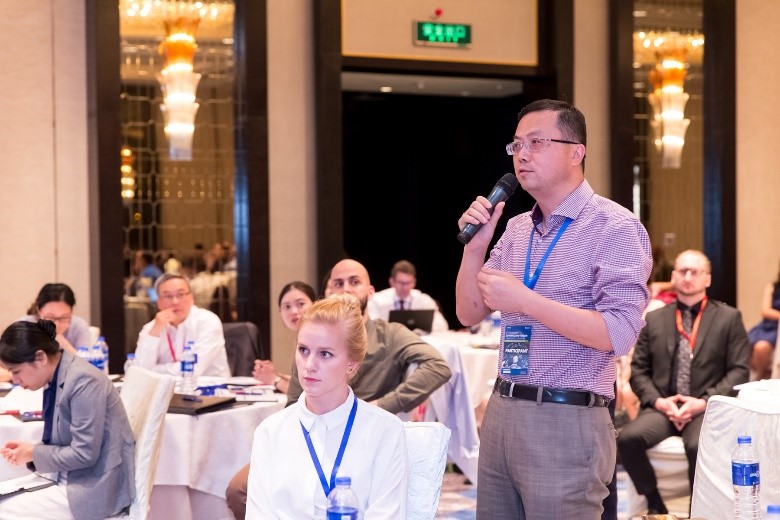
Source: Organization team of the Forum
In the workshop “Plant/Production Controlling“, Mr. River Yu, Director Regional Controlling Greater China, and Ms. Hui Xu, Industrial Controlling Greater China at Schaeffler Holding (China) Co. Ltd. shared with the audience the practice of production controlling at Schaeffler. As a leading global automotive and industrial supplier, Schaeffler has currently manufacturing footprint in 5 cities in China and one new site which will be ready in 2019. Corresponding to the steady growth of manufacturing activities, the workload of plant controlling team of the company has also been growing. The main job of production controller is not only to provide monthly standard reports, but also to help non-controllers to take corrective measures for achieving their budget. In this context, they should also support non-controllers to quantify the financial impact of eco-/social-related actions. Major challenges facing the controller team are not only cost pressure and outlook accuracy but also local talent war and the need for enhancing training for non-controllers. Without good understanding and acceptance of controlling by manufacturing people, it is difficult for plant/production controller to deliver support essential for sustainable success of business.
Picture 5: Exchange and networking during the coffee break
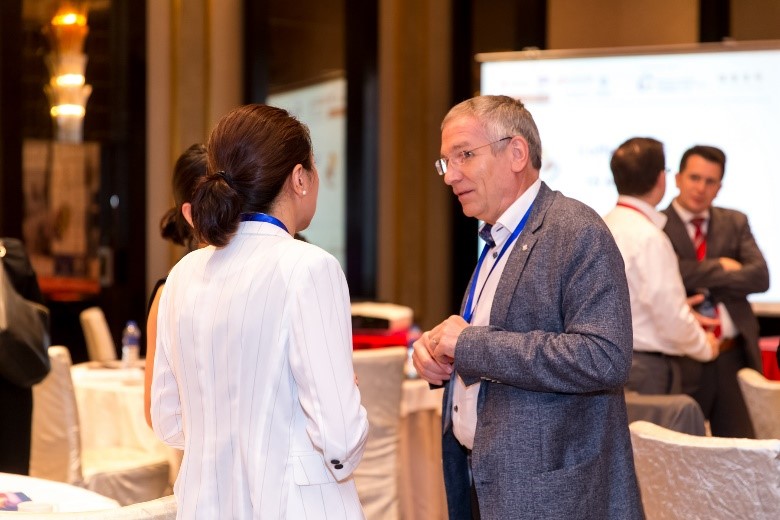
Source: Organization team of the Forum
The workshop “Environmental Compliance in China – How You Can Manage Your Company’s Risks in a Stricker Regulatory Environment” was led by Mr. Yong Wang, founding partner of Greenment, a Shanghai-based environmental information technology company, and Mr. Peter Corne, managing partner in Shanghai and head of the Cleantech Business Group at Dorsey & Whihem LLP. Both speakers have extensive experience and expertise in the field of EHS compliance and management. Starting the workshop with some scenarios in the real life, the speakers showed the increasing risk of environmental compliance in China due to significant changes in the regulatory environment. Explaining the latest development of regulations regarding environmental permitting, pollution discharge permit, hazardous waste and soil contamination etc., the speakers highlighted significant changes of the environmental management and policy of Chinese government which lead to the new normal of stronger law enforcement. Manager and controllers should integrate these issues into the risk management system of business and take a more pro-active approach for risk management. Concepts such as EHS compliance audit and environmental risk management should not only apply for own company but also for suppliers.
Like the workshop “Project Controlling”, the workshop “Cost Management & Controlling for Sustainability” is mainly focusing on the question of sustainability of economic / financial performance of business. The speakers were Mr. Keven Chen, Finance & Controlling Manager, and his colleague Mrs. Chasy Zhou, Chief Financial Officer at Weidmüller Interface (Shanghai) Co. Ltd. Weidmüller is a global player for industrial connectivity. Controlling is understood by the company as business partnering between controller and manager who work in a team like pilot and co-pilot with a common cockpit (KPIs). Besides classical concepts for cost management and optimization, such as zero-base budgeting, activity-based costing (for target costs), cost center responsibility in combination with reasonable cost allocation, Weidmüller is asking all organizational units to regularly “raise the bar again” for sustainable EBIT improvement. Workshops are organized with both controller and non-controllers for identifying cost-saving potential and planning concrete actions for product cost optimization. To have more impact on business and cost-saving, controller should develop good communication skills for closer co-operation with non-controllers.
Picture 6: Participants in the workshop
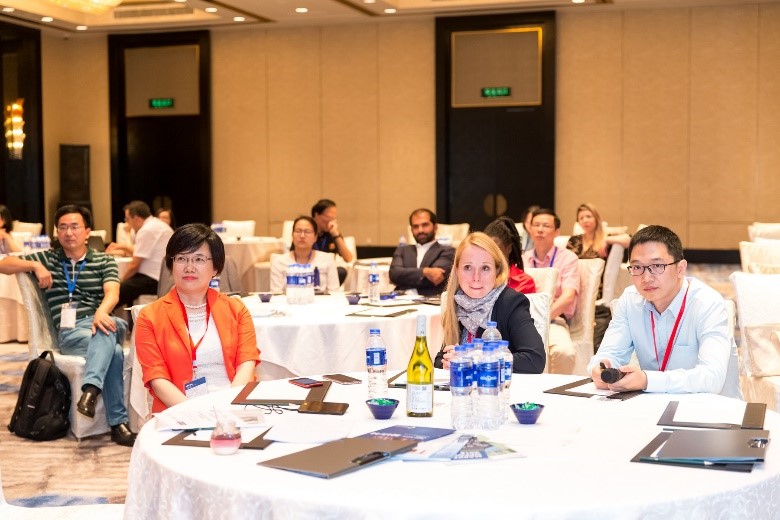
Source: Organization team of the Forum
The workshop “Compliance & Data Security – Challenges from Tightening Regulations and Needs for Monitoring” was led by Mr. Ramesh Moosa, Partner for Cyber Security & Forensic Technology at PwC management Consulting in Shanghai, and Dr. Annie Xue, Senior Attorney from the Rui Bai Law Firm. Business can’t be sustainable, if one ignores the growing risks arising from modern IT technology. The expert team introduced the audience into the world of cyber & data security and talked about relevant topics, such as the risk of cyber-attacks and common practices for risk management, the new China Cyber Security Law (CSL) and its enforcement as well as specific areas of law, such as data localization, cross-border data transfer and personal information protection etc. With increasing risks for business and tightening regulations, the topics discussed in this workshop are not only interesting for IT specialists but also important for managers and controllers who would like to achieve sustainable business success in China.
How can planning & budgeting have an impact on sustainability? This question was in the focus of the workshop “Planning & Budgeting for Sustainability”. The speaker is Ms. Lu Wang, Head of Controlling Greater China at Bayer China. Bayer is positioning itself as a global player trying to solve problems of human being in regards of health and food. Sustainability is a core element of Bayer’s corporate strategy. It has been made transparent in its integrated Annual Report since 2013 which aim is to elucidate the interactions between financial, ecological and societal factors and underline their influence on Bayer’s long-term development. The report is aligned to internationally accredited guidelines, such as those from Global Reporting Initiatives (GRI), UN, OECD and ISO. What is reported should also be planed. Bayer has integrated many eco- and social-related KPIs into its annual planning & budgeting process. And controllers at Bayer try to help non-controllers in quantifying the economic impact of eco-/social-related activities. An interesting question for discussion is here how to measure some social-related objectives, such as gender equity, and how to define target value for relevant KPIs.
Picture 7: Panel discussion in the afternoon hours
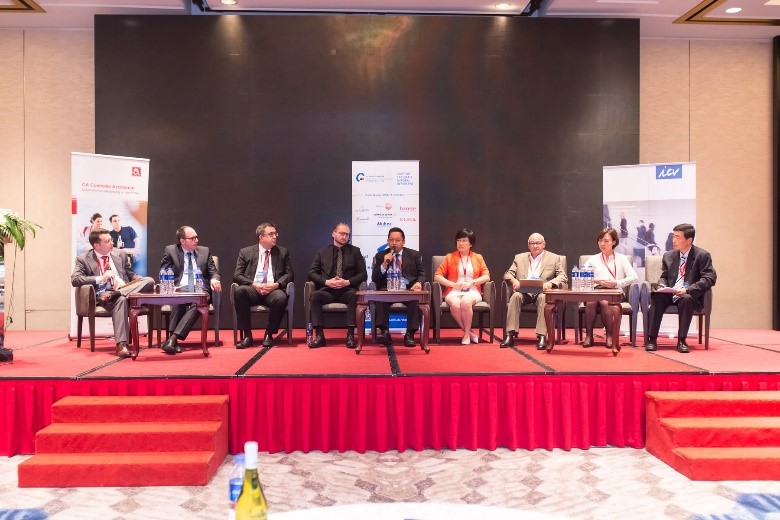
Source: Organization team of the Forum
The highlight of this year’s Forum is the presentation “Green Controlling Practice in Germany and Ideas for China” after the coffee break in the afternoon. It was provided by Mr. Francesco Ingarsia, CFO of Schaeffler Greater China and Leader of ICV Work Group East China. He shared with the audience some results of the Green Controlling Study of ICV in 2011 and 2016 and presented major thinking and practices of Green Controlling in German-speaking countries. For him, Green Controlling also does matter in China, and controllers in China can do a lot for making business greener. Potential ideas are, for example, defining relevant KPIs and reports, providing tools and methods to consolidate data into one information platform as “source of single-truth”, integrating eco-/social-related contents into planning & budgeting, and helping non-controllers in taking corrective measures for closing performance gaps.
Many of his ideas seem to have been implemented at least by some of the participants of the Forum, although there seems to be further potential for improvement. This is the preliminary result of an ad-hoc survey among the Forum participants during the Forum day1). The preliminary survey result was presented directly after the speech of Mr. Ingarsia.
This opened the Panel Discussion of VIP speakers at the end of the Forum. All VIP speakers share the opinion that Green Controlling – in the sense of a more integrated controlling approach which takes eco-/social-related aspects of business into account – is also important for China business, and that companies can try to make their controlling practice greener, for example by building the topic into the existing risk management system, critically reviewing existing controlling tools and processes, and changing the mindset of both controller and non-controllers for more awareness and participation in this field.
The Forum was closed by a summary remark of Mrs. Sigrid Winkler from German Chamber Shanghai. After one-day exchange and networking and with many take-aways for own controlling practice, all participants are looking forward to meeting each other again in next year’s Sino-German Controlling Forum.
The 2018 Sino-German Controlling Forum was jointly organized by Shanghai De Chen Enterprise Management Consulting Co. Ltd. and German Chamber Shanghai. It was supported by the International Association of Controllers (ICV) and CA Controller Akademie from Germany as well as by Taicang Round Table TRT, DUSA European Association Suzhou and Changzhou International Manager Forum. Schaeffler Greater China, Kern Liebers China and Dorsey & Whitney LLP were official sponsoring partners of the event. Facilitators of the Forum and its workshops were Dr. Zhen Huang from Shanghai De Chen Consulting, Mr. Alexander Prautzsch and Ms. Sarah Ommelen from PwC Shanghai.
Note:
- As of September 18, 2018, there are 30 submissions in total. For all participants of the Forum, The result of the survey can be viewed or downloaded from the online documentation space of the 2018 Forum.
************ End of the Detailed Report ************
For more information or media inquiry, please contact us:
Shanghai De Chen Enterprise Management Consulting Co. Ltd.
– Your Partner For Achieving Total Performance Excellence –
Consulting | Training | Services
2501 Wheelock Square, 1717 Nanjing West Road, Jing An District, Shanghai 200040, China
Tel.: 0086 21 6157 4970
Fax: 0086 21 6157 4971
WeChat Account Name: ChinaControlling

